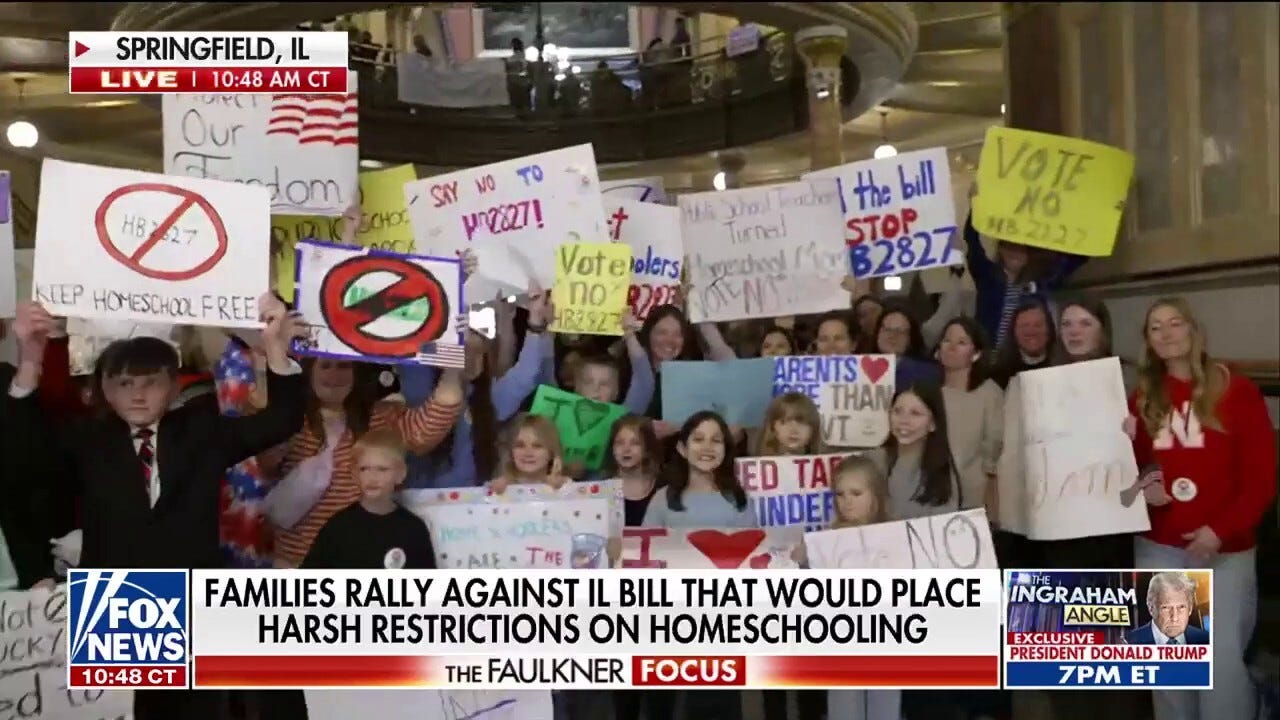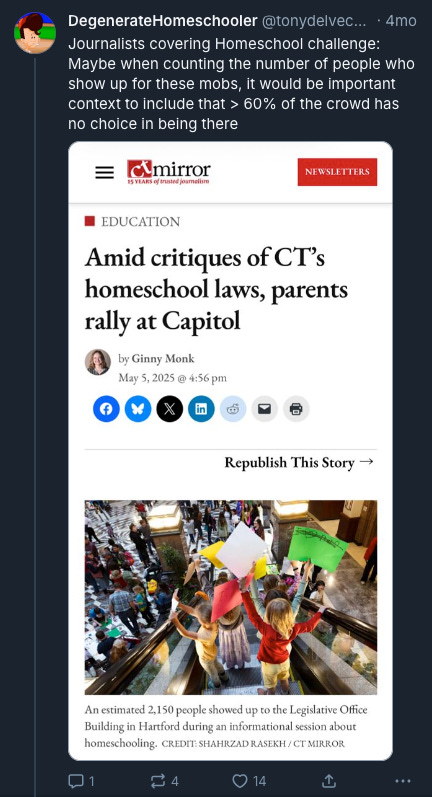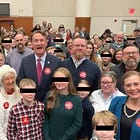Law Banning Child Sex Offenders From Homeschooling Stalled After Nine Child Sex Offenders Testify Against It
Illinois lawmakers proposed the state's first protections for homeschooled children; at least nine registered child sex offenders appeared as witnesses against the now-stalled bill.
Reporting & analysis by Tony Delvecchio. Additional contributions by Fennick Nym.
In February, Illinois state Rep. Terra Costa Howard introduced what would have been the state’s only safeguards for homeschooled children. The Homeschool Act (HB 2827) would create diluted versions of the same protections that public school students are owed. Among those guarantees included in the bill: ensuring homeschool children’s primary educator holds a high school diploma or equivalent, entitling children to documentation of their education, and banning child sex offenders from homeschooling. The bill passed the Education Committee in April but stalled in the House chamber, eventually succumbing to opposition from the Home School Legal Defense Association (HSLDA), Americans For Prosperity, and at least nine registered child sex offenders.
Through analysis of the Illinois General Assembly’s public testimony records, we have identified nine individuals listed on the Illinois State Police’s Sex Offender Registry who submitted witness statements against HB 2827—their convictions ranging from sex-trafficking to distribution of child pornography, and forcible sexual abuse. The ages of registrants at the time of offense range between 17 and 67, with victims ranging from infancy to 16. While the oldest offense is from decades prior, one offender’s witness slip was submitted while their verdict was still pending. Another was arrested two weeks after the April education hearing in a sex-trafficking sting operation.
Few state legislatures have updated their homeschool requirements since they were first codified in the 1980s. Instead, most states are dismantling what few protections exist for homeschooled children. At the beginning of this year only three states restricted homeschooling in households with registered child sex offenders, but after Utah’s spring legislative sessions only two states maintain those restrictions. Child marriage advocate and Utah freshman Rep. Nicholeen Peck, a regular speaker for Great Homeschool Conventions and publisher of a homeschool coaching program, sponsored the bill removing those restrictions, despite homeschool alumni demanding more—not fewer—protections. The bill passed 69-1.
Peck, like the rest of the Homeschool institution, argues that child sex offender restrictions within homeschooling statutes unfairly target homeschooling parents. HSLDA further claims that existing child abuse laws already prohibit offenders from homeschooling, just as Illinois Republican Rep. Blaine Wilhour argued during HB 2827’s April hearing. This claim is regularly repeated despite being verifiably false; documented cases show registered sex offenders have done so in compliance with the law. But the frequency of registered child sex offenders homeschooling is unknowable, as the Homeschool lobby has obstructed the basic counting of homeschool students in twelve states, including Illinois. However, Illinois’ public system for filing testimony presented a rare opportunity. Contrary to the Homeschool institution’s claims, our analysis of the witness list found child sex offenders who presented testimony against HB 2827 and are currently homeschooling in Illinois.
The names of sex offenders do not appear in isolation. While any individual can submit testimony for a bill, the offenders who appear as witnesses against HB 2827 are joined by a network of relatives and associates. At odds with the Homeschool movement’s assertion that they are a self-policing institution, the offenders are integrated to various degrees within a larger homeschool network. The willingness of HSLDA to take such extreme opposition to this basic protection—which it targeted for removal in compromise negotiations—does not just trap children in the homes of sex offenders, but endangers the families and community it supposedly represents. In one case, we identified a registered child sex offender currently participating in a local homeschool group. They are a lifetime member of the HSLDA as well as a lifetime member of the national sex offender registry for forcible sexual abuse of a seven-year-old. Their name appears on the witness list beside the names of their spouse and four children.
In the end, it was this network effect that enabled the identification of each subject within the publicly redacted version of the witness list. In multiple cases, it was children’s names alongside their parents’ that signaled a match on the sex offender registry. The number of witnesses was frequently cited as evidence of grassroots opposition, yet no one noted that the witness list was overwhelmingly filled with the names of children. HSLDA and Illinois Christian Home Educators stated that opposition to the bill was partly rooted in concerns over children’s privacy, and objected to the requirement of submitting information to government officials. Yet while making these statements in committee hearings, they were sending alerts urging members to submit their child’s personal information to the government database, appropriating the data and agency of children in service of their own interests.
HB 2827’s opponents pointed to the failure of public institutions as justification for homeschooling’s sovereign status, but what are we to make of a movement that—as it weaponizes the transparency of public institutions—weaponizes the opaqueness of its own institutions? The Homeschool lobby does not want homeschool children trapped in the houses of child predators, but it does want it impossible to know if homeschool children are trapped in the houses of child predators. The threat that any bill poses doesn’t rest on an individual statute, measure, or requirement; each is opposed for the voice it could return to homeschool children, and the threat children pose when able to speak for themselves.
While technically still alive, the bill is functionally dead. Sponsor Terra Costa Howard is vacating her seat in the 42nd to serve on the Illinois Circuit Court, much to the celebration of the Homeschool lobby. Even in a state with every advantage, a Democratic trifecta with dual super-majorities, it joins a never-ending pile of failed legislation to protect the most vulnerable. The representatives and organizations who led the charge against the bill are below.∎





